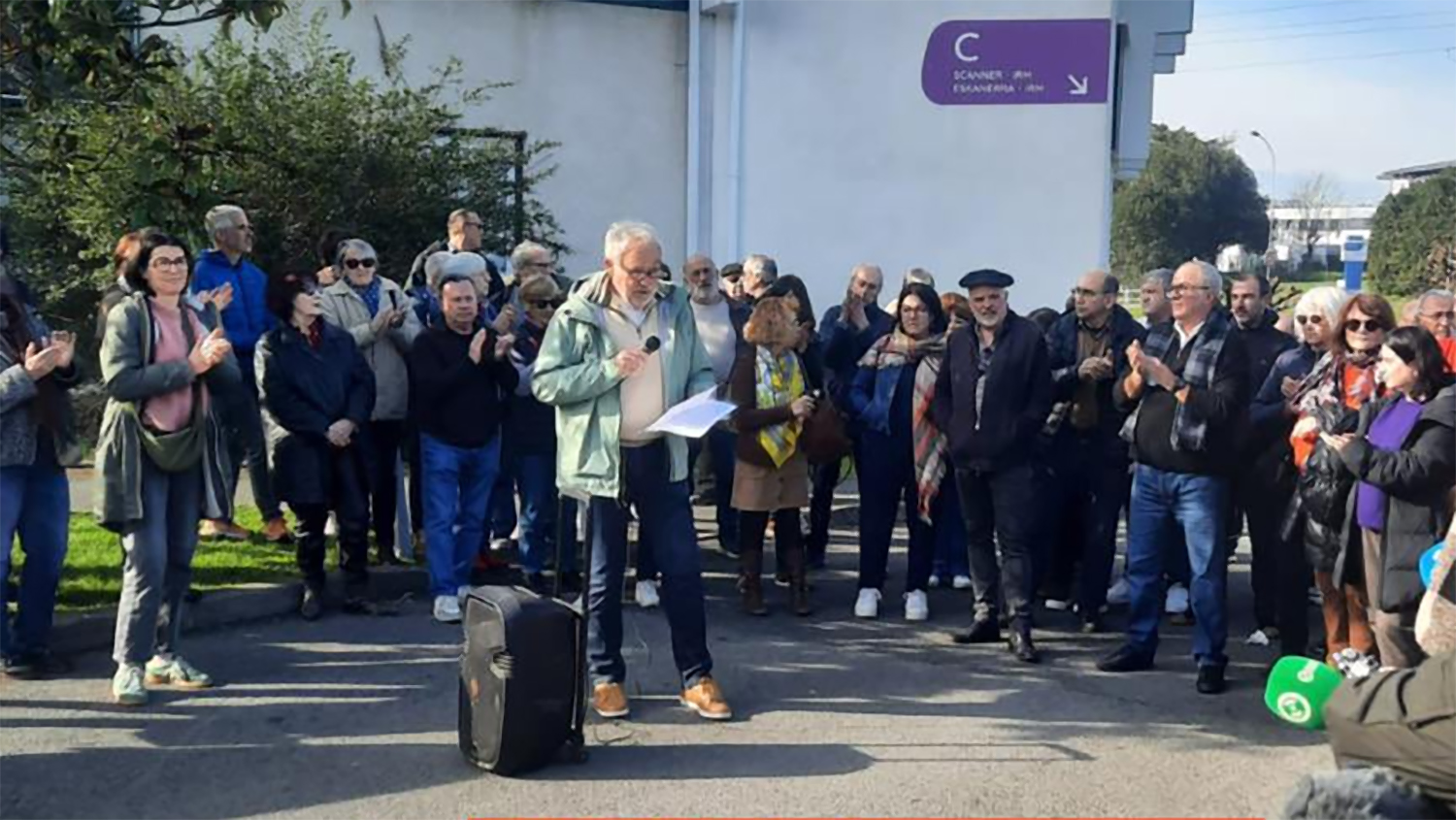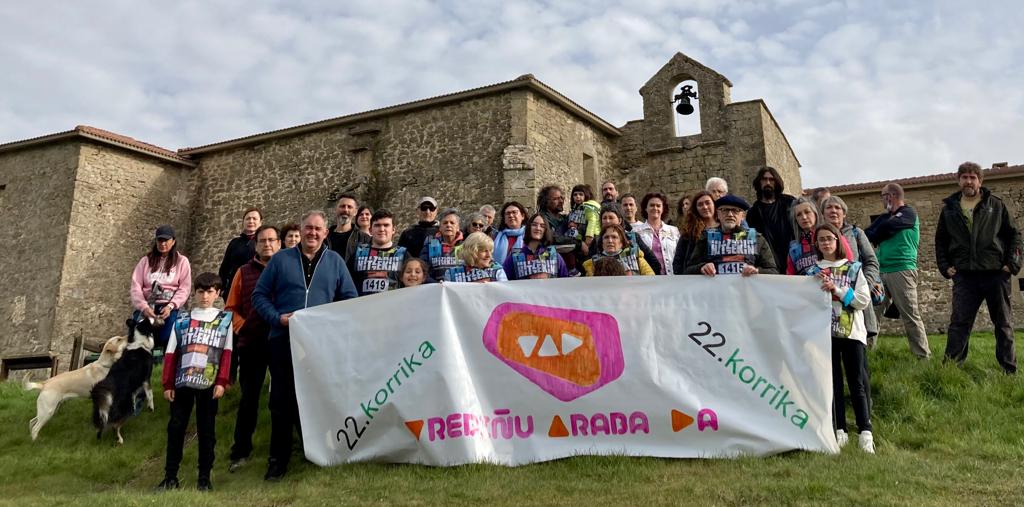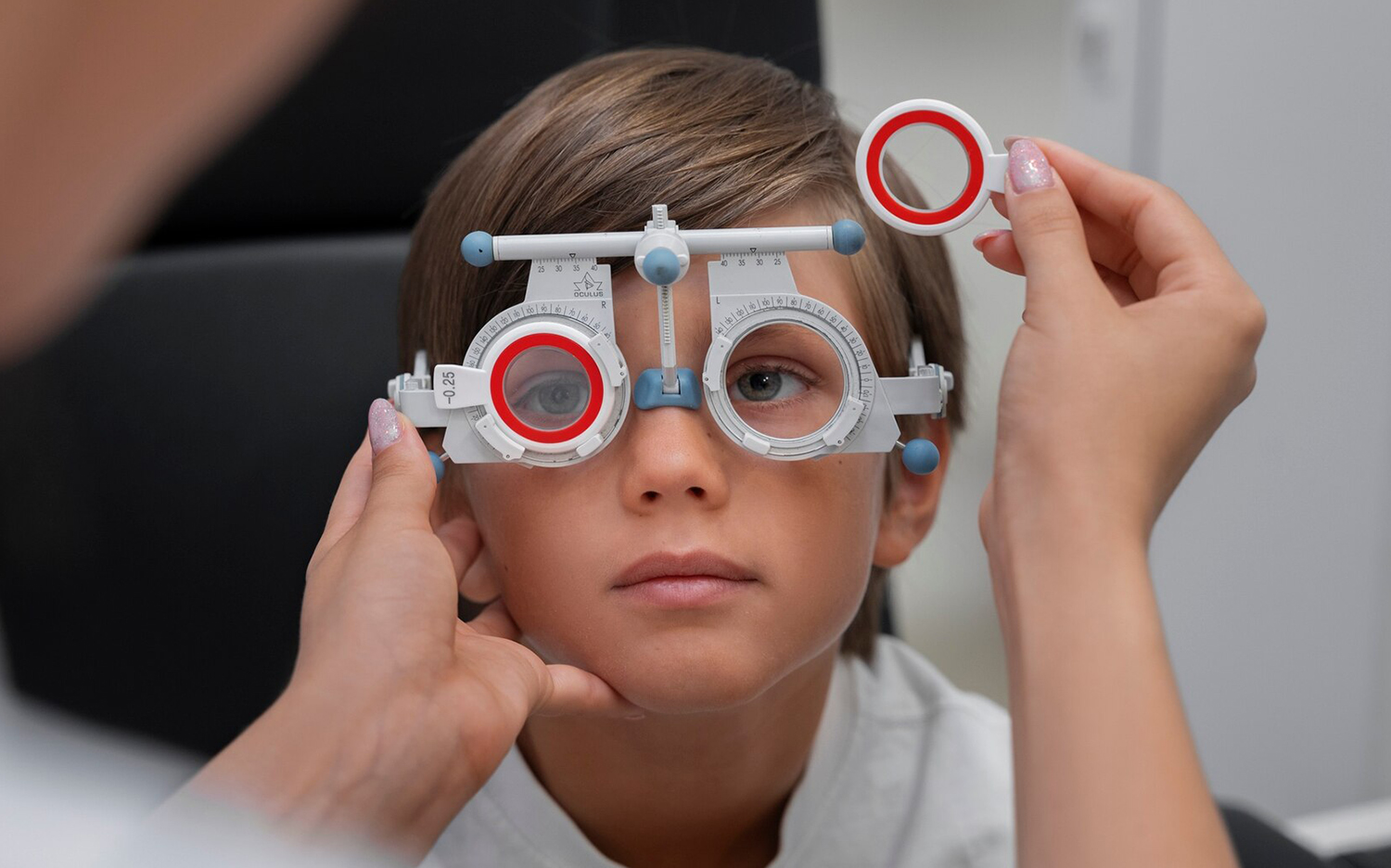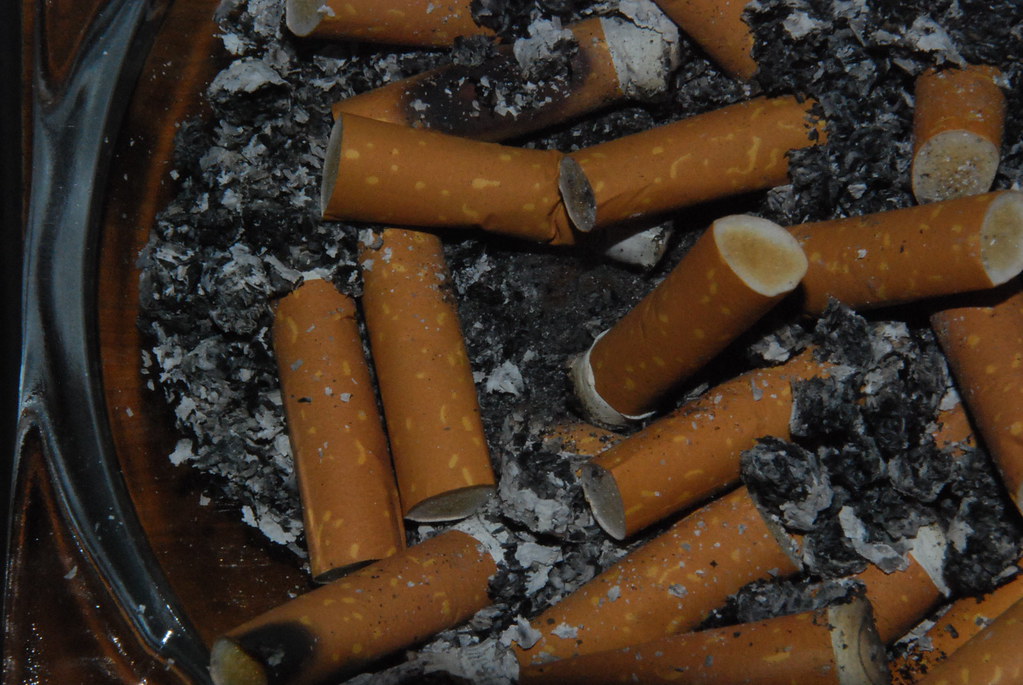Punk&roll to violate the silence of those affected by thalidomide
- Preparation of toast and breakfast coffee, hairstyle, tooth brushing and makeup. You may feel like simple tasks to start the day, not all of them have the same importance. Placed on the skin of someone with functional diversity, they gain in complexity, although it does not seem that Alejandro Díaz, Rafael Basterrechea, Ana Castillo, Manuel Bioque and Mariano Garmendia behave in the face of everyday tasks. With the skill developed over the years, they are easily adorned and prepared for breakfast in the video clip of the song Tears de Arena. However, things have not been as simple in your case as they could have been, as birth with malformations caused by a drug has made it a little more difficult. Díaz, Basterrechea, Castillo, Bioque and Garmendia are one more of the thousands affected by Talidomide, and although they are part of the large group affected, their history is silenced. The musical group Azken Hatsa and the Talidomide Victims Association AVITE have collaborated to denounce that the reality they live has been uncovered and that they have not been compensated for today. Result: Video clip Tears of Arena.
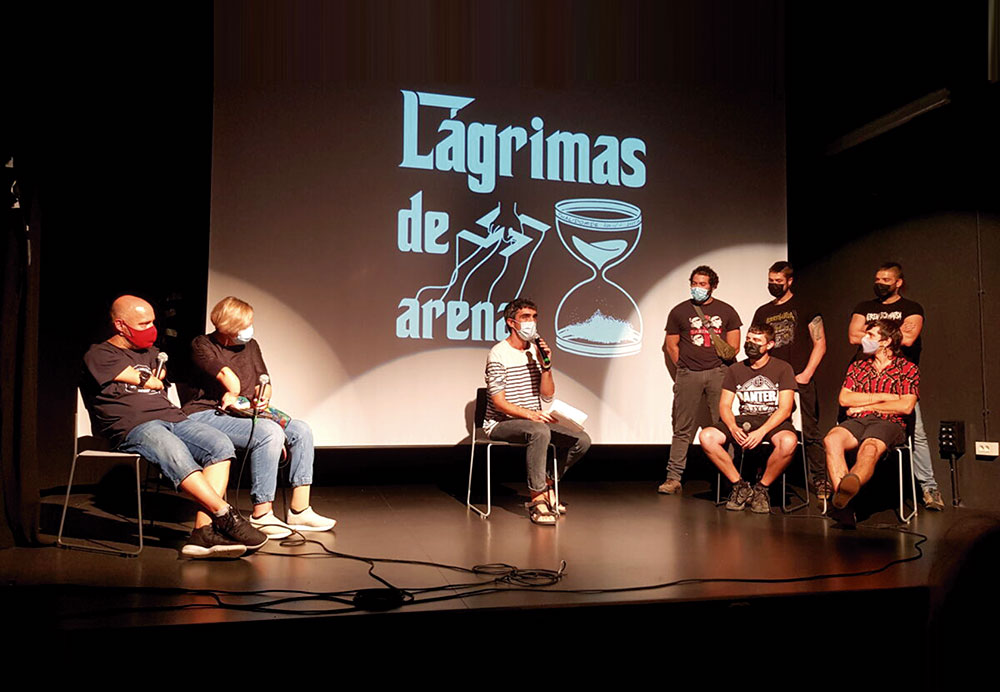
Thalidomide was marketed in 1957, a drug created by the German pharmaceutical company Grünenthal GmbH. Despite the fact that its creators presented it as safe, it generated distrust from the very beginning, and so it didn't reach the market in the United States, for example; Dr. Frances Oldham Kelsey refused to market thalidomide and asked for more studies about it. Other countries, such as France, would follow the same path. However, in about 50 countries it was prescribed as a sedative or as a remedy against nausea from pregnancy until retirement. At the time of 1959, several experts, such as pediatrician Widukind Lenz and child radiologist Klaus Knapp, began to pay attention to the secondary damage. Lenz and Knapp began to investigate the cases of children born with malformations and demonstrated thalidomide behind them. Conclusions were published in the Thalidomide embryopathy study in 1962. That same year he withdrew from the thalidomide market in Germany and the other countries would follow him behind, although the drug would take time until it disappeared from circulation. The drug was later withdrawn in the Spanish state in 1985.
The damage caused by the drug in the range available is not of any kind: As underlined in the research article Thalidomide, historical and ethical contexts (Thalidomide, historical and ethical context), “the consequences of thalidomide became a pandemic dimension”. According to data provided by AVITE member Rafael Basterrechea, in various interviews, it is estimated that thalidomide has damaged 50,000 people, causing the death of the majority. There are nearby cases that have not been recognized or compensated for the damage done today. Unlike other countries, neither the pharmaceutical company nor the government in the Spanish State has taken care of what has happened. The Azken Hatsa group and the AVITE association wanted to highlight the crux and injustice of reality.
The punk&roll group Azken Hatsa has been the first to be interested in the initiative and want to know more. While Iosu and Julen explained to their teammates, they were told the motivation that they are being driven by, and with their hands we have known all the details of the project. According to the foregoing, awareness of the reality of those affected by thalidomide is due to Iosur, which has an idea of the collaboration launched together with AVITE. He intended to visualize the reality of his uncle and many other people affected by the drug and, being his instrument the music, told the members of the group his intention to make a song on the subject. They said it and they did, they started composing the song, and once it was finished, they saw it clear that it wasn't just any song. Believing it would go unnoticed on a record and among other songs, they thought they had to do something more “serious” with Tears of Arena. “Then we contacted Mariano [Garmendia], Iosu’s uncle, is a member of AVITE and we asked him if the association wants to do something with the song.”
Late repair
AVITE members enthusiastically accepted the proposal of the last Breath. Garmendia states that it provided them with a unique opportunity to raise awareness of the reality of those affected by Thalidomide. He knows better than anyone the importance of giving visibility to the issue, both in order to demand compensation and reparations and for the injured to become aware of what has been done to him. In fact, one of those small tangles that got the issue to occupy the public square made it easier for him to be linked to it between his congenital malformations and the influence of thalidomide. That is what it says: “There was a trial back in 2012-2013, the issue appeared in the press and I started hearing about it, and I realized that the people there were very similar to me. Then I contacted the AVITE association and without knowing whether I was harmed or not, I became a partner.”
The Scientific Medical Committee has recognised a small percentage of the 584 people who have undergone medical tests for thalidomide
As a result of their integration into AVITE, footprints are being collected. He passed several tests and the experts told him that he could also be harmed by thalidomide. Another significant step was going to her mother. When asked if you had taken any medicine while pregnant with Bera, the range of doubt was greatly reduced. “He replied that yes, he had a rather rough start of pregnancy and had been prescribed some pills.” Tests carried out in 2018 will definitely dispel the doubt: “In March 2020, they gave me the result and told me yes, that my malformations were a result of thalidomide.”
The evidence that Garmendia has passed for the official damage to the talidomides should compensate those who have in principle achieved a positive result, as the Government of Spain approved a budget line in the 2018 budgets, with the vote against the PSOE and the abstention of the PNV. However, the victims have not yet seen anything – “we are waiting for the government to draft a Royal Decree-Law to start receiving compensation,” Garmendia explained – and they are less than expected. In fact, for the indignation of AVITE members, the conclusions of the Scientific-Medical Committee of the Ministry of Health have recognized a small percentage of the 584 people who have carried out medical tests in relation to thalidomide; the results of the 511 concluded that 80% were not affected by thalidomide. Before learning the results, and faced with the irregular opinion of the test procedure, AVITE attorney Ignacio Martínez García told El Salto in the report The victims of thalidomide in Spain feel scammed by the State (the victims of Thalidomide feel scammed by the State): “We suspect that they want to act like in 2010 and recognize the damage to people based on how much money there is, rather than the other way around.”
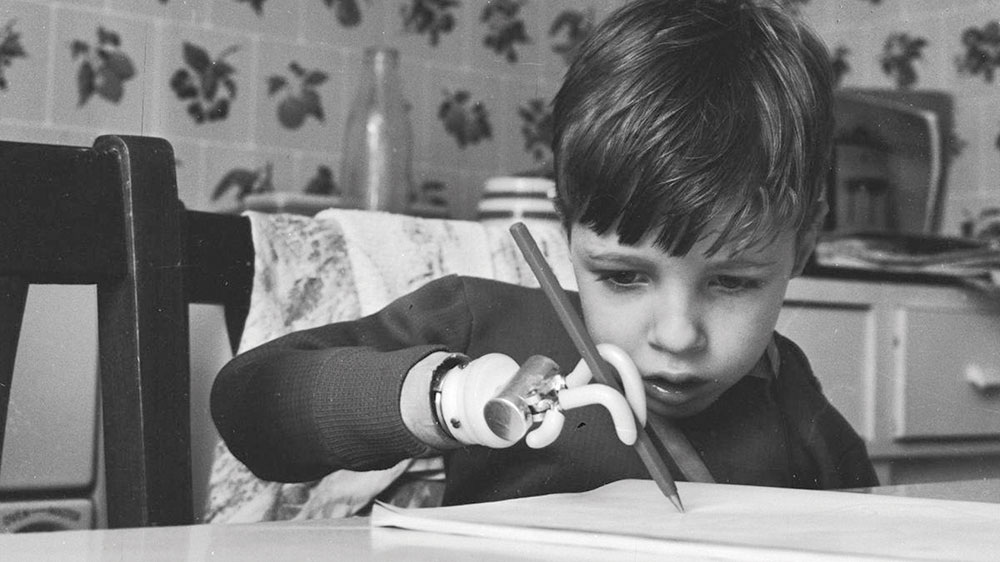
Martínez refers to Royal Decree 1006/2010, whereby only 24 persons who met the requirements set out therein were compensated. Seeking redress and compensation for the integrity of the victims, AVITE initiated in two years a legal proceeding by means of a lawsuit against Grünenthal. The issue of thalidomide was going to make Garmendia aware of the media impact of the trial that began after the complaint filed. In 2013, the first instance pleaded guilty to the pharmacist and forced her to compensate. However, following the defendant ' s appeal to the Provincial Court of Madrid, the defendant gave him the right on the grounds that the case was prescribed, and this was confirmed by the Supreme Court. The Spanish Constitutional Court and the Court of Human Rights in Strasbourg dismissed the appeals lodged by those concerned in this situation. Neither Grünenthal nor any court denies the damage caused, but with the argument of what is prescribed they have freed those responsible from responsibility.
The political route began to be exhausted by the judicial route, and the State was also held responsible. Garmendia explains what the situation is at the moment: “AVITE appeals to the government for the abandonment of functions because it has not brought out the royal decree in three years. Therefore, at the moment there are two possible avenues: either the government takes out the Royal Decree-Law, or the judges will have to say something”.
"We are waiting for the government to draft a Royal Decree-Law to begin receiving compensation"
Francisco Javier García Mora, a doctor who refused to be part of the El Salton Scientific and Medical Committee, who spoke with crudety of the Government's position: “There is no willingness to resolve this issue and it has never existed, because it requires opening the door to a significant compensation chapter. In Spain, the diagnosis has been and continues to be tobacco in 60 years. There is no government interest in identifying people for diagnosing and compensating cases. It’s better to wait and let them die.”
A song that breaks the silence
Waiting for the Government or the judges to tell them, the members of AVITE got involved in this imminent recession. Knowing that the video clip they had was a loudspeaker to extend the reality of those affected by thalidomide to the four winds, they wanted to ensure that the opportunity was thrived and the message was disseminated as loud as possible, with this objective the search for collaborations of significant names in the field of music was undertaken. The invitation was accepted by Aiora Renteria (Zea Mays), Koldo Soret (Niña Coyote y Chico Tornado), Fernando Madina (Repeat Incidents) and Enrique Villarreal El Biologico, and together with the friends of AVITE and Azken Hatsa, have acted in the song of the long years of silence.
The result of a year’s work was publicly presented on September 10 at the Herri Antzokia in Legorreta and the following day it was exhibited on the network. The authors want the video clip to be a reinforcement towards the socialization of the theme. “It’s striking, and hey! We are still here and this issue is about to be resolved,” says Garmendia. The latest Hatsakos, for their part, have highlighted the curiosity and recognition of the issue and the struggle of AVITE, adding to the list of speakers the pain of mothers who grew up of children affected by thalidomides: “Many people have died without acknowledging the harm that thalidomide has caused them, due to many mothers, and in the case of mothers, they have gone beyond guilt. The birth of your child as a result of your guilt. And their emotional, psychological, physical burdens -- they've been enormous."
Arena, a swastique appears and the detail can surprise the viewer. Anyone who does not approach the issue, because in the first blow it will hardly be able to establish a relationship between thalidomide and Nazism. However, some scholars of the origin of the drug have implied that thalidomides can be Nazi inventions. Martin Johnsson, director of the English association The Thalidomide Trust and Carlos de Nápoli, have made coincident readings, suggesting, among others, thalidomide II. He could have been born during the World War in experiments to search for the neurotoxic gas antidote and had conducted drug tests in concentration camps. Both have considered the Nazi Otto Ambros as the possible founder of the talidomide; Ambros, condemned in the Nuremberg process, would work a few years later in Grünenthal.In an interview with Goierriko Hitza,
Mariano Garmendia said: “Thalidomide tests were conducted in concentration camps. Franco and Hitler managed very well, so it is suspected that Spain was also a spool.”
Soco Lizarraga mediku eta Nafarroako Duintasunez Hiltzeko Eskubidea elkarteko kidearen ustez bizi testamentuak heriotza duin bat eskaini eta familiari gauzak errazten dizkio.
Gauez ia aste osoan ateak itxita izaten ditu Donibane Lohizuneko osasun zentro horretako larrialdi zerbitzuak. Herri Berri udal oposizio taldeak deituta, mobilizazioei ekin diete herritarrek eta jadanik 3.000 sinadura bildu dituzte zerbitzu "iraunkor eta eraginkorra"... [+]
Bizilagunek "egia eta politika" merezi dutela adierazi dute, oraindik konponbiderik bilatu ez zaizkien arazo ugari edukitzen jarraitzen baitute. Ikasketei eta osasun arretari loturiko arazoak nabarmendu dituzte.
Udaberri aurreratua ate joka dabilkigu batean eta bestean, tximeletak eta loreak indarrean dabiltza. Ez dakit onerako edo txarrerako, gure etxean otsailean tximeleta artaldean ikustea baino otsoa ikustea hobea zela esaten baitzen.
Gazteagotan baino lotsa handiagoa dauka, baina horrek ez dio saltsa askotan ibiltzeko gogoa kentzen Leire Zabalza Santestebani (Iruñea, 1990). Beste gauza askoren artean, Motxila 21 musika taldeko kidea da. Nabarmendu du musika gauza asko aldarrikatzeko bide izan... [+]
Miopia gero eta gehiago eta gero eta lehenago ari da garatzen, eta horren arriskua da dioptriak gehitzen joatea eta helduaroan begiari lotutako hainbat gaitz izateko aukerak dezente handitzea. “Eguzki-argia jasotzea inportantea da, eta denbora asko ez igarotzea oso gertu... [+]
11 doctors in health care earn 230,000 euros each year, one of the practices 18,000 euros
This Thursday, EH Bila asked the Government of Navarre to investigate and correct this situation in the plenary session of the Parliament of Navarre. The UPN and the PP have joined the... [+]












